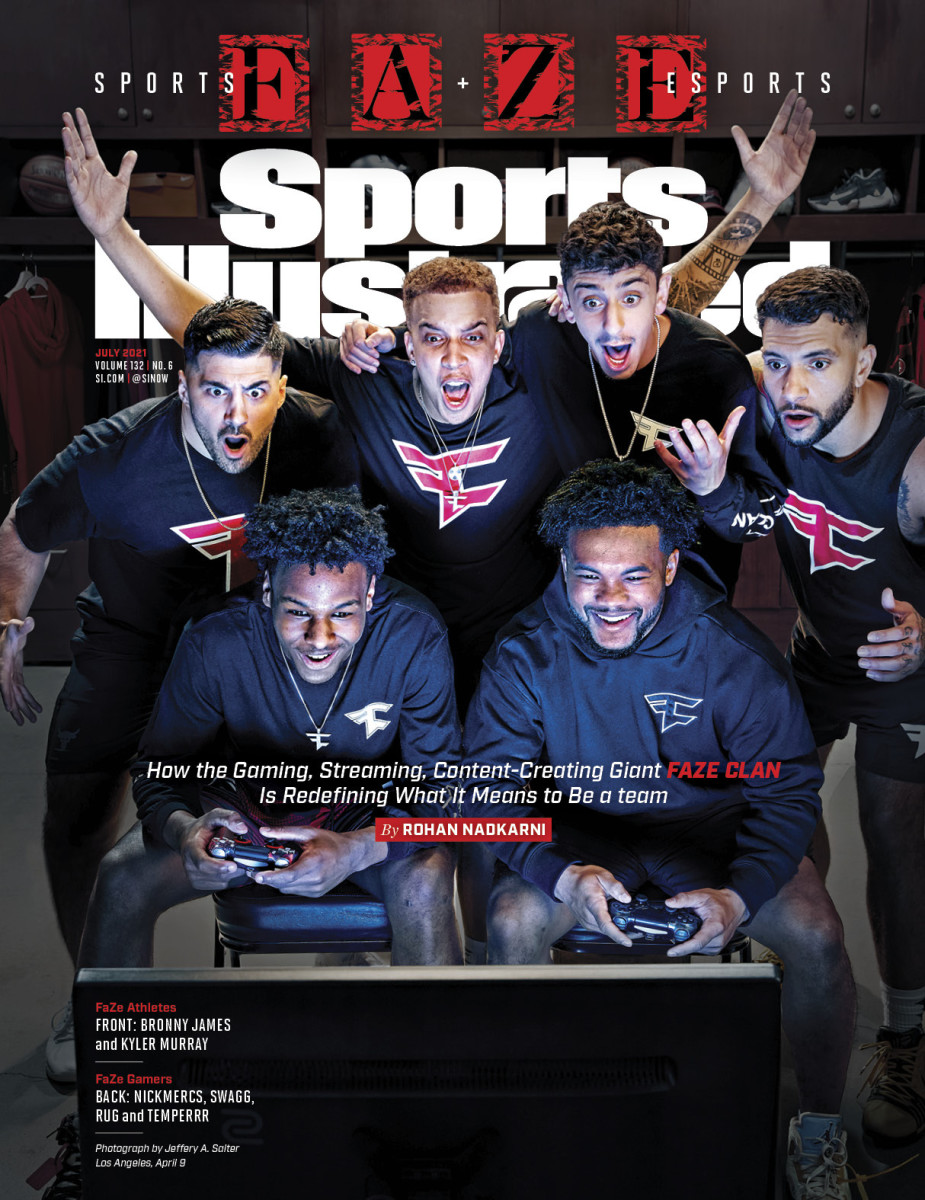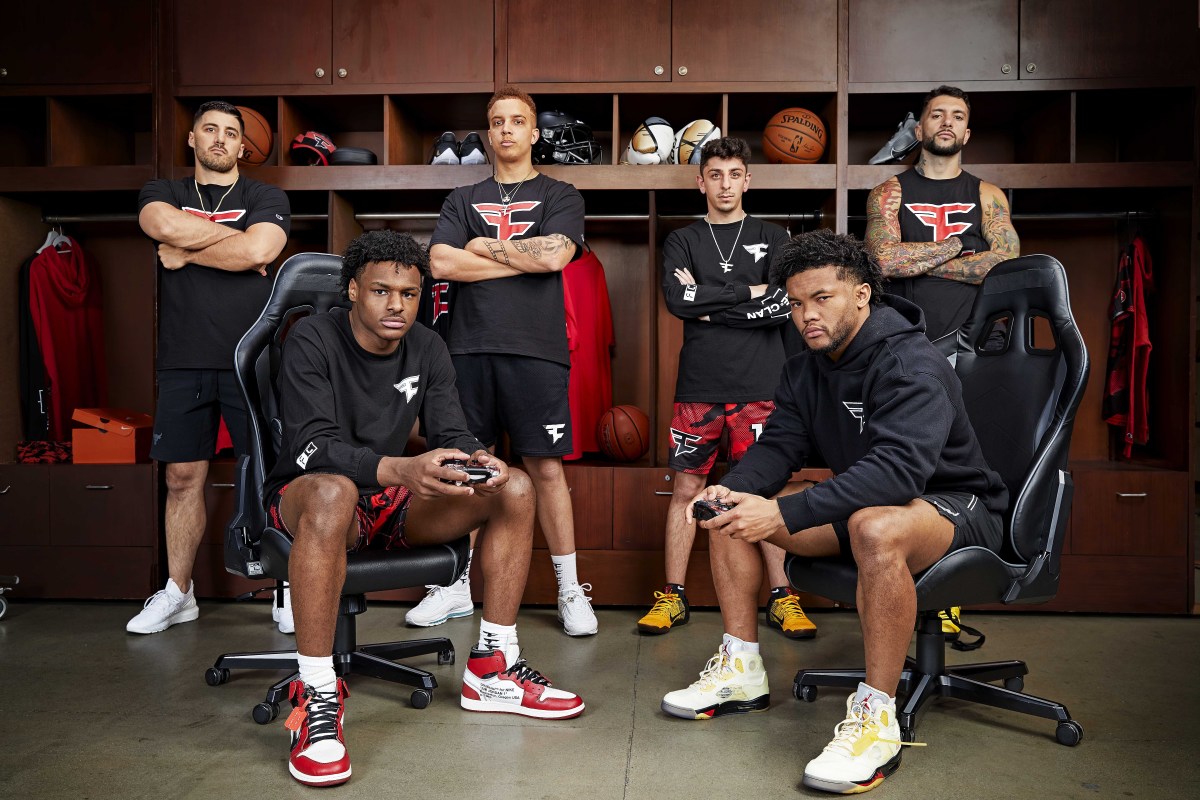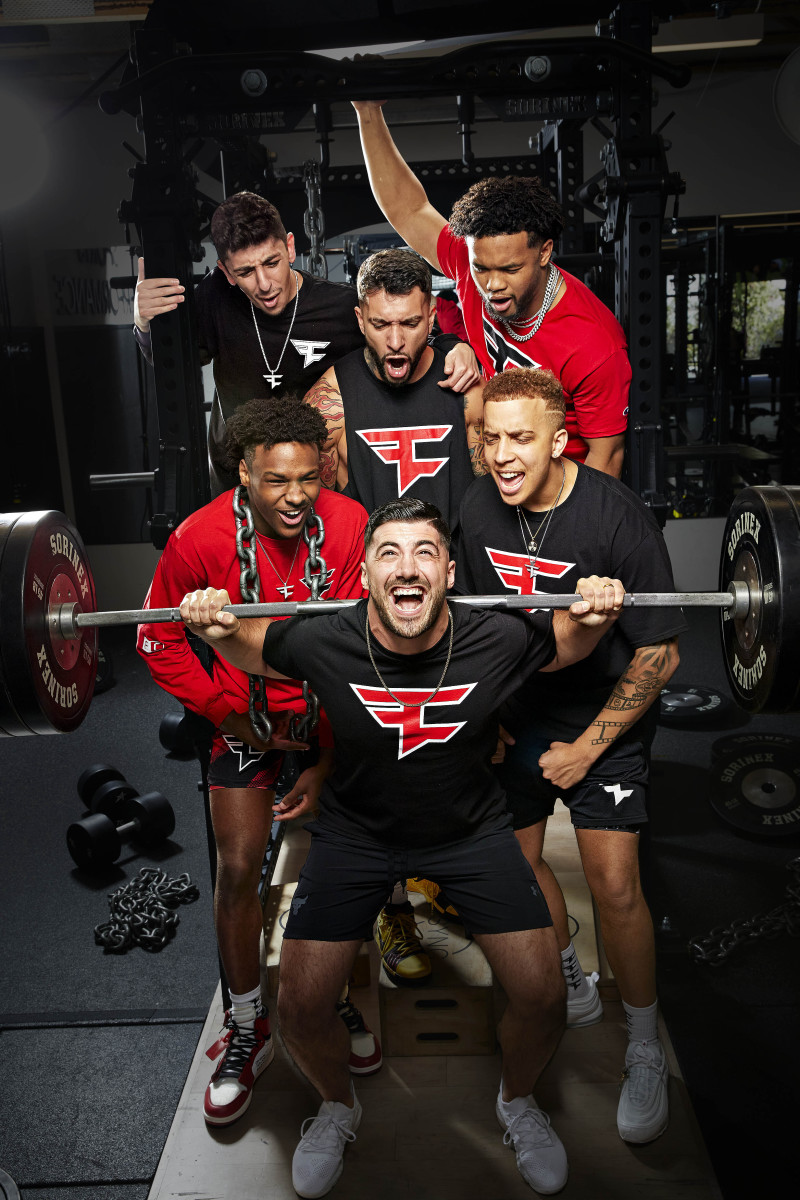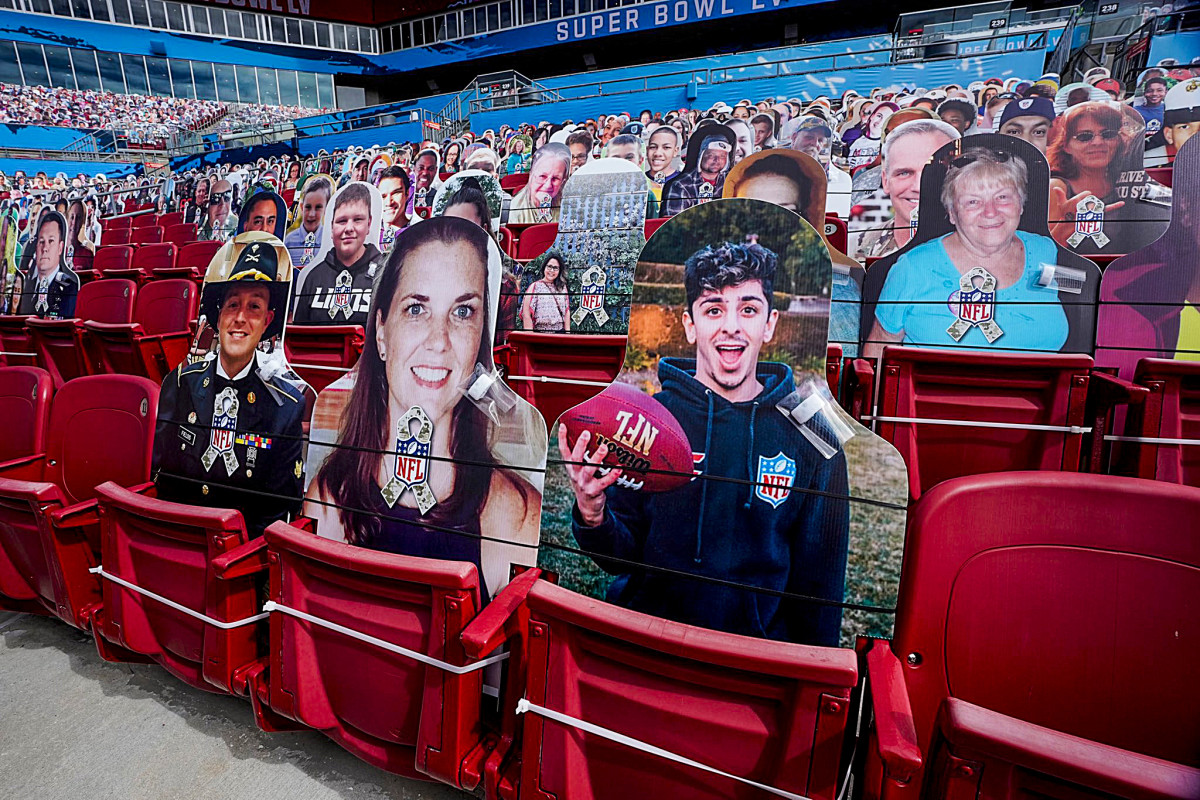The Stream Team
When you wind your way up Mulholland Drive in Los Angeles en route to the home of Lee Trink, it’s hard not to gawk at the massive mansions with conspicuously green lawns hugging the curvy, narrow road. When you arrive at Trink’s address you won’t pull up to the house itself, but rather to a driveway long enough to allow a plane to take off with an attendant whose job is to make sure the collection of high-priced vehicles belonging to Trink and his guests has room to breathe while parked. Once you get inside the house, you’ll avoid stepping on rugs that look to be made of bearskin, you’ll walk past the pool glistening over the city below and eventually settle down on the patio, which has a view of downtown Los Angeles ripped from Michael Mann’s Heat. But this isn’t the home of a movie star. This isn’t where Drake filmed his last music video. This has all been made possible by . . . video game streaming?
Sort of. Trink is the CEO of FaZe Clan, a gaming collective born in 2010 as a YouTube channel for creative “killshots” performed in the video game Call of Duty. Now, depending on which side of the millennial–Gen Z line you sit, FaZe has grown into either a confusing digital behemoth that serves as a stark reminder of how the world has passed you by, or a cultural (and merchandising) force that bonds a disparate groups of gamers, athletes, musicians, influencers and content creators into an amorphous digital squad that has become the internet’s version of the cool kids’ table in your high school cafeteria.

• Get the July 2021 issue featuring our FaZe Clan cover story here.
“Gamers are the next generation of the new iteration of rock stars,” says Trink, who was an executive for several music labels before becoming FaZe CEO in 2018. “People recognize that. And people want to be a part of that wave.”
Putting an exact definition on that wave isn’t easy. FaZe Clan fields teams of professional gamers who compete at elite events in games like Call of Duty, Counter-Strike, PUBG, FIFA, Rainbow Six, Fortnite, Valorant and Rocket League. (Most of the players on these teams are scattered around the world and join up for tournaments, but the Call of Duty team is based in Atlanta.) But aside from recent Call of Duty success, FaZe is hardly dominant in the tournament space. Rather, it has built an empire on the noncompetitive allures of sports and esports: community, entertainment, personality and endless hours of digital and social media content. The founding fathers of Faze are a quintet of gamers who began streaming Call of Duty sessions and YouTube shorts a decade ago: FaZe Temperrr (government name: Thomas Oliveira, a 27-year-old from Brazil), FaZe Banks (Richard Bengston, a 29-year-old from Massachusetts), FaZe Apex (Yousef Abdelfattah, a 24-year-old from California), FaZe Rain (Nordan Shat, a 24-year-old from Canada), and FaZe Cbass (Sabastian Diamond, a 27 year-old from Canada). The universe they created now includes more than 90 esports pros and content creators from around the globe, along with a growing cohort of athletes and musicians who play video games but also post YouTube videos and create Twitch streams around gaming, fratty humor and lifestyle content, giving millions of fans an intimate peek into their lives.
While rival esports organizations suffered during the pandemic as live-event revenue dried up, FaZe grew. At the end of last year Forbes valued FaZe at $305 million and estimated that 80% of its $40 million revenue in 2020 came from its content arm. That business is driven in part by a strategic embrace of big names from beyond the gaming world. Hugely popular skateboarder Nyjah Huston, hip-hop superstar Offset and Pitbull are part-owners, as are NBA stars Ben Simmons, Jamal Murray, Meyers Leonard and Josh Hart. Just before the NFL draft in April, FaZe announced that it had invited Kyler Murray to be its newest member with a social-media-friendly video of Banks channeling Roger Goodell and making the Cardinals quarterback FaZe’s No. 1 pick. That made Murray “teammates” with one of the top prospects in college basketball’s recruiting class of 2023: LeBron James Jr., the 16-year-old son of a certain NBA icon, joined the FaZe crew last summer (with no money changing hands so he can preserve his future NCAA eligibility). The relationship is symbiotic: The FaZe name gives members like James and Murray legitimacy in the gaming world and helps them extend their brands to different audiences. And for FaZe, partnering with some of the most famous athletes in the world presents the opportunity to stretch into whatever corners of the mainstream they haven’t yet captured.
For now, it’s hard to tell who is benefitting more. Nickmercs, FaZe’s most popular streamer, has nearly six million followers on Twitch and nearly two million Twitter followers. Temperrr alone has more than two million subscribers on YouTube. The FaZe Clan page has more than eight million, more YouTube subs than the Lakers, Cowboys and Manchester United combined.
”Why did I join FaZe?” asks Murray. “Because it’s the best of the best.”

Ben Simmons took note of FaZe a decade ago, when he was a teenager in Melbourne who had started playing Call of Duty whenever he didn’t have a basketball in his hands. He’d watch FaZe trick shot videos on YouTube, admiring the streamers’ prowess at the game. One of his favorites was a gamer known for his virtuosity with a controller and a signature CoD move: a spinning, jumping, falling-to-the-ground no-scope kill that’s widely known as the Temperrr shot.
Simmons struck up a friendship with Temperrr through social media. At first blush, an up-and-coming basketball star seeking out a gamer-vlogger would seem to violate what decades of high school movies have taught us. But those stereotypes are clearly outdated. “Guys can relate to them,” Simmons explains. “These are fashionable guys, athletic. They are people you would hang with. It’s just so broad. When you see guys who you are able to relate to, connect with and would hang out with outside of video games, that makes it so much easier. And we get to see who these guys are through their YouTube content.”
As he began attracting viewers, Temperrr, then a part of the YouTube channel FaZe Sniping, recruited Apex, who had been bombarding him with messages on YouTube, to help him make more Call of Duty videos. Rain joined in 2013 after building up his CoD reputation while bouncing among various informal clans. Banks was a successful YouTuber at a rival outlet until Temperrr persuaded him to join FaZe in 2013. Banks and Temperrr then moved into a house together in New York in 2014, and they started incorporating vlogging into their channels in addition to gaming content. From there, their subscribers and viewership numbers took off.
Though the company had humble beginnings, the FaZe experience is now marked by a grandiosity that would make tech billionaires blush. They throw massive parties in Los Angeles, sometimes equipped with indoor skate parks, sometimes with rapper BlocBoy JB doing the Shoot. They challenge rappers turned investors to one-on-one basketball games with $1,000 on the line. One day Temperrr may get an invite to Simmons’s basement for a gaming session, the next he may be shooting hoops with Snoop Dogg and surprising him with FaZe merch.
In 2016, the company moved its creators to Los Angeles and put them up in a series of mansions, the most recent being a 36,000-square-foot Burbank fortress where live-in creators mixed Rick Ross levels of opulence with gaming content. The bro-meets-nerd FaZe lifestyle—and the content that comes with it—helped grow the brand beyond the confines of early-2010s gaming. It’s the personality-driven video content, the podcasts, and the Twitch streams that have turned FaZe into a genre-blurring brand. The group’s most popular stars cut through to the mainstream, in large part because they defied the old pop culture stereotypes of gamers. They didn’t seem like kids who chugged Mountain Dew in dark rooms all day. Temperrr’s six-pack would put some athletes to shame.
Sometimes, FaZe even overshadows members of the traditional mainstream: Take, for example, a story from September 2019, where music mogul Jimmy Iovine threw a birthday party at his home for his wife, Liberty Ross. Like most parties Iovine—the former Interscope Records boss who cofounded the ubiquitous headphones company Beats with Dr. Dre—throws, this one was a star-studded affair. Dave Chappelle told a few jokes. Oprah Winfrey floated around, a drink in hand. A casually dressed Leonardo DiCaprio held court with other celebs. Iovine’s 13-year-old stepson, however, asked his stepdad to flex his Hollywood might not to invite more Oscar winners or chart-topping artists. He wanted to know whether his dad could invite his newest business partners: the co-owners of FaZe Clan.

Simmons is far from alone in the athletic world when it comes to his love of gaming. JuJu Smith-Schuster, the Steelers wide receiver, was one of the first pro athletes to turn gaming into a monetizable part of his brand. He often streams on Twitch playing Fortnite or CoD and has built a massive social following across several platforms. In 2018, he joined rappers Drake and Travis Scott, as well as celebrity gamer Tyler “Ninja” Blevins in a record-breaking Twitch stream of Fortnite.
It’s not a surprise to see any athlete flip on their own Twitch stream, from Suns star Devin Booker (who found out the 2020 NBA season was suspended while streaming) to Timberwolves star Karl-Anthony Towns (who often plays with Simmons) to Murray, who boasts more than 70,000 followers on Twitch. Even for someone whose dad is one of the most recognizable people on the planet, the FaZe name did wonders for Bronny James. The views on his Twitch account grew 855% the day after he announced his partnership with the company in September 2020, according to The Washington Post. “And it’s not just for show. Bronny is nice,” Temperrr says. “Make sure you get that in there.”
And if there was any question as to whether LeBron is aware how much time his son invests in video games, Banks says he “dapped up” the worldwide megastar when he bumped into him on a night out in L.A. earlier this year.

Of course, the gaming and content world is not as simple as just sharing your passions with the world. Seemingly everybody who makes their living online eventually runs into some kind of trouble, and FaZe has been no stranger to obstacles or controversies.
FaZe Rain, who is well known for his forwardness with his viewers, was involved in a very public mental health and drug addiction crisis in 2020, tweeting about his issues with depression and prescription pills. By the middle of the year he had been kicked out of the house shared by FaZe content creators, and he accused the collective of treating him unfairly and making him leave against his will. Banks responded on Twitter, saying Rain was offered help and refused.
Rain would eventually seek help for his drug addiction, and in February of this year proudly shared he was six months sober. Though he’s been in a wheelchair since late last year—which Rain says is paralysis as a result of his drug use—he is once again streaming regularly after a rehab-induced hiatus.
Banks himself struggled with mental health issues in 2016, when he took a break from FaZe after experiencing drug addiction, which he revealed in detail on his YouTube page. His public back-and-forth with Rain was also not anomalous. Banks is brash and unapologetic, the quintessential bad boy of the group. In November, he was roundly dragged online after criticizing multiple social media platforms’ decisions to ban Donald Trump from posting. Banks has publicly feuded with attention-economy hijacker and fellow YouTuber Jake Paul (a beef since squashed). And he personally responded on his YouTube page after former FaZe member and Fortnite star Turner “Tfue” Tenney sued the company in 2019 for what he said was an unfair revenue split in his contract. (The lawsuit was settled last August, and Tfue and Banks made up.)
“It was radical authenticity,” Banks says of his response to Tfue. “We do have a lot of people everyday who are trying to make sure we aren’t f---ing up. I just knew we were in the right and this was bulls---.
“That’s to me the coolest part about social media, and we’re slowly losing some of that, because people are so careful of the opinions they share. I genuinely think the people who really care about this s---, they just want to know what’s really going on. And then they can decide if their values line up with yours and if they want to watch you.”
The chaotic energy of being online extends to the business model of the industry itself. The relative newness of gaming corporations and internet content creation means they are ahead of labor laws in many instances, which can be a detriment to the talent. Tfue’s lawsuit was not the only contract dispute at FaZe, which also heard public grumbling from Fortnite streamer Dennis “Cloakzy” Lepore, who complained on a Twitch stream about his FaZe deal two years ago. He left the company amicably earlier this year.
“The esports industry has been absolute chaos and anarchy since its inception,” one agent who represents several gamers told Sports Illustrated. “The labor commission doesn’t understand what this world is yet, and there’s going to be a reckoning when they do.”
For now, different companies categorize some workers as independent contractors and others as full-time employees, with no overarching, industry-wide standard. And while most employees of gaming companies are over 18, there’s a contingent of younger talent. And, the agent says, child-labor laws are more like “guidelines” than hard and fast rules.
Many gaming companies also negotiate sponsorship agreements for their talent, which exist in gray areas when it comes to talent-agency laws in different states. Normally such agreements would be subject to review under talent-agency laws, but gaming orgs aren’t subject to that oversight, which allows for companies to take bigger revenue cuts than they normally would.
Because of the still-evolving nature of the industry, many players are not represented formally and negotiate their own contracts. Unlike their counterparts in say, the NBA or NFL, gamers aren’t coming into industries with long-established unions or standardized career pathways.
That’s an issue in an industry where there’s millions of dollars available to the most successful talent. “I think the big problems are lack of bargaining power and contracts that aren’t really negotiated at arm’s length,” says Catherine Ruckelshaus, the legal director at the National Employment Law Project. Ruckelshaus says workers in these scenarios often sign contracts the way a consumer may quickly click “Yes” through the terms and conditions of a phone app.
“It is very important the talent in this industry understands their worth,” says Ryan Morrison, the cofounder and CEO of Evolved Talent Agency, a firm that represents gamers. “This is an industry where they are getting the eyeballs, they’re the ones earning money, they’re the lifeblood of esports. And they don’t take that seriously.”
Trink admits the company has hit obstacles as it navigates dealing with talent, yet another parallel to his time as a record executive. He concedes FaZe’s roster, which is overwhelmingly male and white, is still lagging when it comes to gender and racial diversity, adding that he’s looking for the right solutions as opposed to expedient ones.
“We have to do it in an authentic way, but have more diversity on our roster,” Trink says. “But we can’t just do it kneejerk, try to fix the problem tomorrow, because people are raining hell on us. Sure, we’d love to get people off our back, but not at the cost of betraying who we are . . . We’re definitely focused on it. It would be great if it was faster. But are we going to do things when we feel it’s right? Yes.”

Iovine, who along with Dre sold Beats to Apple for $3 billion in 2014, says FaZe’s appeal is simple.
“They have a platform, and it’s limitless what they can do with that platform,” Iovine says. To him, FaZe has a captive audience and an opportunity to capitalize on its loyalty. He laments how many layers have gotten between the artists and the consumer in the music industry, but believes FaZe can deliver its product more efficiently—as if a record company had set up a streaming service of its own. While gaming content is still largely reliable on Twitch and YouTube, the gap between commercialization and consumption is small.
“I believe that in the next five years they’ll be the biggest lifestyle brand in the world,” says Paul Hamilton, who co-owns the Call of Duty League’s Atlanta FaZe team with his own company, Atlanta Esports Ventures. “The way content is being consumed is different. My kids will never go to the TV, turn it on and see if there’s cartoons on. They go to their iPad and go watch their favorite streamer. FaZe Clan has been in that area for so long. They have a better idea of what their fans want to consume and how it evolves.”
Atlanta FaZe has been one of the more successful CoD teams. Atlanta was in first place at the end of the 2020 regular season and, earlier this year, took home a $200,000 prize as the Stage 1 Major Champions. But even as someone who works more in the esports world, Hamilton realizes where FaZe loyalists exert their real power. “We have a great reputation for taking care of our players, but at the end of the day, when FaZe signs a streamer, they grow exponentially when they add the logo,” Hamilton says. But FaZe’s success is not only about slapping its logo on popular gamers. They’ve used their reputation to bring more people in the tent than ever. Athletes used to be the antithesis of gamers—now FaZe is helping them be seen as one and the same.
• How the L.A. '84 Olympics Changed Everything
• 'This Should Be the Biggest Scandal in Sports'
• The Mental Peril of This NBA Season
• Police Killed George Floyd. An MMA Fighter Punched Back
